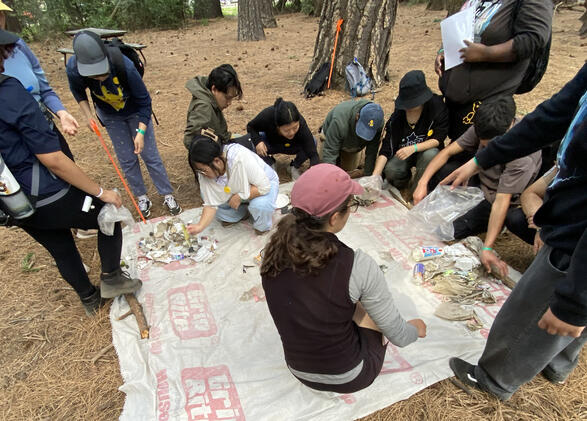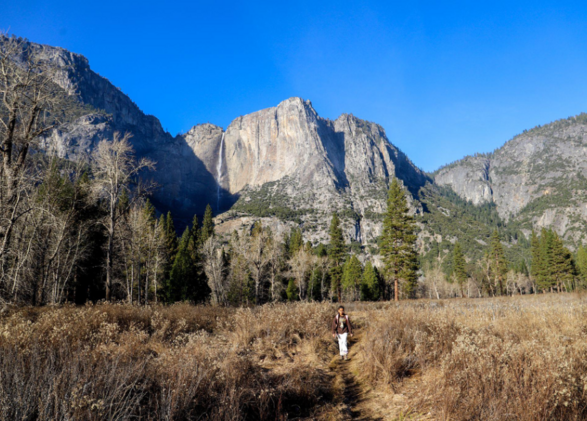Armstrong Scholars Part II: Full Circle

Jacqueline Ruggieri held her arm up to the screen on our Zoom call. Scrawled in beautiful cursive on her wrist: “gulp life.” The phrase comes from a poem written by Joie Armstrong, and according to Jacqueline, it perfectly embodies who she understands Joie to have been before she was tragically killed in Yosemite National Park in 1999.
“Joie is that poem, ‘Gulp Life,’” she says. “There are at least three of us associated with the program who got this tattoo on our wrists independently of each other.”
When she got the tattoo in 2011, Jacqueline was a NatureBridge educator seven years removed from her experience as an Armstrong Scholar. For her, the path from one to the other is clear and direct. Without participating in the Armstrong Scholars program, she’s not sure where she would be today.
“I got this in 2011 when I led students from my old high school into Yosemite. It felt right. It felt full-circle,” she says.
Four years later, she would attempt to make her journey come even more full-circle.
“The only way you get to do Armstrong twice is you apply and get to be a scholar, and then end up being a NatureBridge educator, and apply and are accepted to lead it,” says NatureBridge’s former Education Manager in Yosemite Kim Laizer. “And there’s only two people I know who’ve done that.”
Talking with Jacqueline, you get the sense that there are several pivotal points in her life that serve as markers — remarkable events that define personal epochs. Her experience as an Armstrong scholar in 2004 was one such event.
“My instructors would tell you that I barely said a word on the trip,” she says. “Until I got quarter-sized blisters on my feet and I had to talk.”
Jacqueline describes herself as an introvert. She has a calm, soothing voice that is as confident as it is genteel. She speaks with compassion and puts thought into her words, not rushing to conclusions or to break silences.
“While I wasn’t speaking [during Armstrong], my life was being changed in ways that I was still processing.”
Jacqueline grew up in a Mexican, Catholic household led by her mother and grandmother. She was the oldest of her siblings and generally considered herself to be a responsible, dutiful daughter.
“I was a good kid. I had a job, I was quiet, I followed the rules,” she says.
She had applied to take part in the Armstrong Scholars program and received a voicemail from Molly Huber, the NatureBridge educator who would be her future leader on the trip. Jacqueline knew what calling her back would most likely confirm: that she was accepted into the program.
“I was in the dining room, on the phone with Molly and my mom was in the kitchen. She looked at me and said, ‘you’re not going.’”
Her mother saw the two-week adventure into Yosemite National Park as a shirking of Jacqueline’s duties, and even more seriously, as abandoning her family. Jacqueline, for the first time in her life, rebelled.
“‘I’m going,’ I said, and then I walked out of the room while she continued making dinner. That was not like me. Aside from coming out, this was my biggest rebellion.”
Jacqueline’s Armstrong experience can feel distant from some of the others that are often highlighted. The challenges, the goals, the impromptu dance parties — staples in the enshrined memories of many past scholars and leaders — don’t land in her personal highlights. For Jacqueline, being an introverted 17-year old who’d yet to come out as gay meant that the smaller moments and introspective opportunities stand out in her mind.
“One of my favorite parts was the GRANITE meeting because we weren’t moving,” she says. “We got a chance to be still and spend time together without a goal in mind.”
GRANITE is an acronym, with each letter standing for an action the scholars would take during the meeting. It stands for Greeting, Reading, Appreciations, Nugget (which can be a song, short game or wildcard) I feel or Inspiration, Tonight and Tomorrow, and finally, Ending. GRANITE meetings have evolved over the years, fluctuating from leader to leader, but the basic tenets are the same and the outcomes are the same: creating community, fostering connection and unearthing vulnerability.
“At the beginning of the trip, I struggled asking for help,” says Jacqueline. “That was a difficult thing for me. It took those blisters on my feet to learn it.”
Her leaders, Molly Huber and Erica Tucker, helped coax Jacqueline into being more comfortable with not only asking for help, but in being herself. They actively created a space in which she and all the other scholars could feel free in their identities. Sometimes they inadvertently created that space, too.
“I don’t think I’ve ever told Erica this, but when the trip first started, I caught a glimpse of her Nalgene bottle. It had her initials, E.T., on it, and right beside her initials was a pride flag,” says Jacqueline, taking a moment to be silent.
“I didn’t fully know what that meant because I was from a very small community. I didn’t even have any hints at coming out until I was in college, but that was so powerful to me in retrospect.”
I was a totally different person. I decided I’m not sorry for being myself. I’d gained self-confidence, self-awareness and overall awareness of others, the planet, wilderness, societal expectations of people and especially of women.Jacqueline Ruggieri
When Jacqueline returned from her Armstrong experience for her senior year of high school, everyone noticed a change in her. Her teachers, her parents and her peers could see a transformation had taken place.
“I was a totally different person,” she says. “I decided I’m not sorry for being myself. I’d gained self-confidence, self-awareness and overall awareness of others, the planet, wilderness, societal expectations of people and especially of women.”
She experienced some backlash from peers in high school. Realizing the freedom of being yourself at a young age had its consequences.
“It was lonely. Learning this powerful lesson at age 17 put me way ahead of the game, but being yourself at that age can be isolating,” says Jacqueline.
“So I went toward the opposite of isolating and lonely: to teaching, to education and eventually back to Armstrong.”
Jacqueline earned her Bachelor of Science in Environmental Education and Interpretation at Humboldt State before coming to NatureBridge as an educator in 2011. Four years later, in her first time applying to become an Armstrong Scholars program leader, she was selected.
“In environmental education, you usually have one day to hopefully make an impact, and you never get to see the other side of that,” she says. “I wanted to lead because with Armstrong, you get to see the change.”
Elements of the program had evolved in the 11 years since Jacqueline had been a scholar, but the spirit and many traditions remained the same. Jacqueline’s biggest challenge as a leader was to reconcile her expectations with the reality of leading a new group of young women.
“I learned from my mom that you have expectations of your children, and it’s hard to let that go sometimes, especially when you’ve lived a life already and theirs is fully ahead of them,” she says. “I can relate the leadership experience to that parental experience: I had to let go of my expectations based on what I’d found wonderful or helpful 11 years back.”
Jacqueline and her co-leader helped create that very same safe environment that allowed her to be herself as a 17-year old. Being on the other side gave Jacqueline an appreciation for Erica and Molly, and also deepened her understanding of how her transformation happened; that it was not without intention.
“Through all of the challenges and the activities, the bonding and the spirit of Joie being brought in, the program creates this ‘free to be me’ feeling throughout the whole experience,” says Kim Laizer.
[Armstrong] didn’t make me a shining star; it made it okay for me to be me.Jacqueline
It’s fair to say that Jacqueline’s initial rebellion paid off. Today, her mother understands the incredible impact of the Armstrong Scholars program and is deeply proud of her daughter’s work. Jacqueline is now an admissions counselor at Oregon State University, her first “computer job” after 10 years in the field. Though she finds her current position immensely fulfilling, she often misses working with young children outdoors.
“There were so many opportunities for me to talk about dream-chasing at that age; especially to talk to people who looked like me, who were people of color or queer.”
She believes she can still spark that dream-chasing excitement in higher education. Jacqueline is focused on bringing outdoor opportunities to college students who might not have had them as kids.
“I’m trying to support students who aren’t or can’t afford to be out in nature; find kids like me in college who didn’t go backpacking or mountain biking or skiing just because they couldn’t afford it,” she says.
It is those types of students that have always drawn Jacqueline to education, be it environmental education or higher education. She wants to ensure that kids who are quieter like she was get a chance to blossom and self-actualize.
“There are lots of shining stars in environmental education. I’m married to a shining star,” Jacqueline says, laughing. “But there’s space for everyone. [Armstrong] didn’t make me a shining star; it made it okay for me to be me.”
More than 17 years after that first life-changing Armstrong journey, Jacqueline’s advice to applicants or those selected is simple yet profound:
“It’s okay to be yourself. Even if back home doesn’t feel that way, or the next phase of your life doesn’t feel that way, just be yourself here on this trip, and know that you’re okay.”





